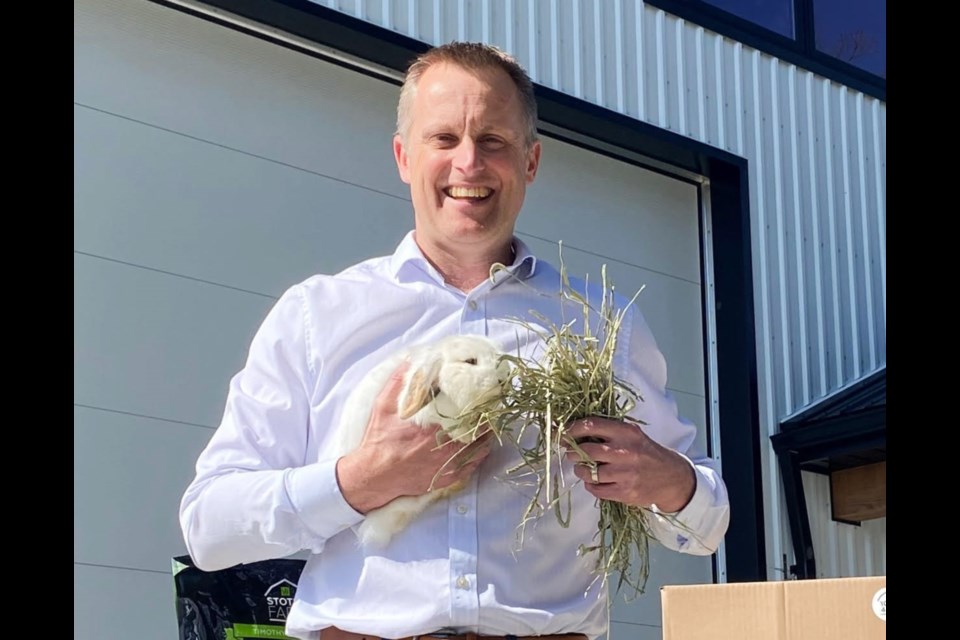One family's decision to own guinea pigs eventually led them to a decision to farm the animal's favourite food: timothy hay.
Jason Stoter, his wife Faye and their family are behind Stoter Farm. Started in 2019, the farm aims to provide Canadian timothy hay to Canadian pets. Today, it ships timothy hay nationwide and is aiming to appear in more brick and mortar stores.
“For us to come up with a good, quality option for Canadian hay, people are delighted,” Stoter said of timothy hay, “and we receive feedback all the time from people, Canadians are awesome.”
Timothy hay is a grass containing fibre and protein. It makes up a large portion of the diet for animals such as pet guinea pigs and rabbits.
“Depending on which veterinarians you talk to, and what studies you read, guinea pigs, chinchillas and rabbits, 70 to 90 per cent of their diet is timothy hay,” said Stoter.
The idea for the farm began after Stoter's daughter and son each got a guinea pig six years ago.
“They both had these two guinea pigs, and I thought, ‘What do we feed guinea pigs?’’” said Stoter, who mentions they now have a rabbit and a guinea pig.
“I knew there was always a kibble, but when I looked it up I was like, ‘Oh, it’s timothy hay!’” They eat timothy hay for most of their diet.”
Curious, Stoter did some research and discovered a lot of timothy hay sold in stores is coming from the United States, which inspired Stoter to consider growing it. He mentions he and Faye grew up on dairy farms, and at the time, their family was already growing crops on their farm in Guelph.
“I thought, ‘You know what? I’m going to get into the timothy hay market for small pets,” said Stoter.
Since then, the farm has expanded to sell pellets which are fortified with vitamins and minerals, and orchard grass, which will be available in June.
“It’s been fun, it certainly hasn’t been easy, it’s had its challenges,” Stoter said about the business.
Challenges ranged from growing the product to getting it into stores.
On their farm, Stoter said they do crop rotations to grow new hay each year. Their fields last for three years. Harvesting the hay in June, Stoter said they need three days of sunny weather to dry the hay after it is cut and baled, with each bale of hay weighing an average of 360 kilograms.
“We pray for good drying weather, which is not always the case in southwestern Ontario,” said Stoter. “Those three days really help the hay dry properly, but we don’t want the hay out in the fields for too long, or else the sun starts to bleach the green colour out of the hay, it’s all timing.”
He adds the Timothy hay grown at Stoter Farm is pesticide-free, and as a result, there is additional labour that goes into making it.
“We go and handpick any pests in there, like any unwanted weeds,” said Stoter. “It’s a great opportunity to employ some summer students from university and high school to walk the fields and handpick any of the weeds.”
Any hay the farm doesn’t sell as feed for small pets is sold to nearby horse farms. To get into pet stores, Stoter explains there are stringent packaging requirements.
“The quality of hay required for small pets it’s really high, it’s gotta be high, high quality,” said Stoter, “and you need all the labelling and all the bar codes and you need to pack it up all nicely for the consumer, and that gets expensive when you’re talking about packing up small packages of hay.”
Despite the challenges, Stoter said he enjoys farming and having his children growing up on the farm.
“I love raising a family on a farm,” he said, “there’s lots of opportunities for chores, and for kids to develop good work ethic, for kids to explore and play and be near animals, it’s just a great experience.”



